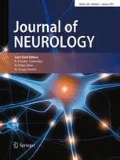Abstract.
Objective: Poststroke depression is a frequent psychiatric complication after stroke that may have strong negative impact on rehabilitation therapy and functional recovery. This study was conducted to show the efficacy and safety of early treatment with the selective serotonin reuptake inhibitor fluoxetine in post-stroke depressed patients. Methods: This double-blind, randomized placebo-controlled study was of patients within two weeks after stroke. Moderate to severe depressed patients (determined by Hamilton Depression Scale (HDS) > 15, the Beck Depression Inventory (BDI) and the Clinical Global Impression (CGI) Scale) were randomized to receive either 20 mg/d fluoxetine or placebo for 3 months. Beside the psychiatric assessment, patients were evaluated by use of the Scandinavian Stroke Scale (SSS), the Mini-Mental-State-Examination (MMSE) and the Barthel-Index (BI). An open-label long-term follow up was done 18 months after the initial assessment. Results: 54 depressed patients of an inpatient population of 242 consecutive stroke patients aged 25 to 85 years entered the trial within the first two weeks post-stroke. 50 patients completed the trial per-protocol. The initial severity of depression was comparable in the two groups (mean baseline HDS score 32.8 in the fluoxetine vs. 30.3 in the placebo group), as were neurological symptom severity and demographic parameters. Significant improvement was seen in both groups within 4 weeks of treatment, whereas no advantages of fluoxetine could be observed at this time. This indicates a high degree of spontaneous recovery during early rehabilitation therapy. BDI scores of patients treated with fluoxetine further decreased until the follow-up at 12 weeks, whereas the scores increased again in the placebo group. This depressive relapse of the placebo patients after the end of most rehabilitation efforts was evident at a long-term follow-up 18 months after inclusion, when patients who had been treated with fluoxetine were significantly less depressed. No side effects of fluoxetine treatment were detected. Conclusions: The advantages of fluoxetine were obvious at the follow-up 18 months after inclusion, but could not be demonstrated within the first three months of controlled treatment. The multitude of therapeutic efforts that take place in the early phase of rehabilitation might have facilitated spontaneous recovery from depression and might have hindered benefits of antidepressant treatment to become obvious. Fluoxetine treatment was well tolerated and safe.
Similar content being viewed by others
Author information
Authors and Affiliations
Additional information
Received: 5 February 2002, Received in revised form: 8 October 2002, Accepted: 28 October 2002
Correspondence to Stefan Fruehwald, MD
Rights and permissions
About this article
Cite this article
Fruehwald, S., Gatterbauer, E., Rehak, P. et al. Early fluoxetine treatment of post-stroke depression . J Neurol 250, 347–351 (2003). https://doi.org/10.1007/s00415-003-1014-3
Issue Date:
DOI: https://doi.org/10.1007/s00415-003-1014-3




